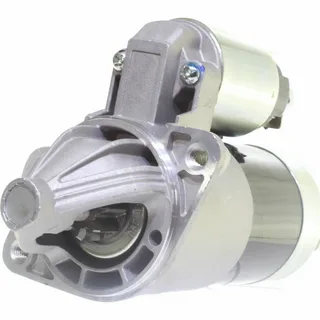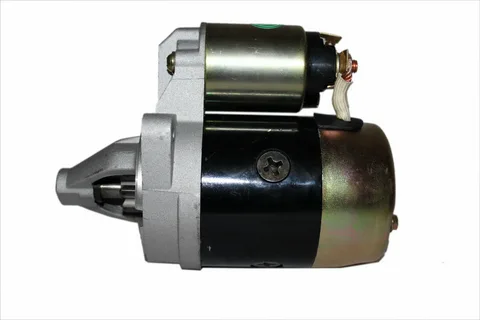The Mitsubishi Lancer Starter Motor is a vital component of your car’s engine, responsible for starting the combustion process that gets your vehicle up and running. While this part is built to last, it can still be subject to wear and tear over time. As a car owner, it is important to know how to properly maintain and extend the lifespan of your Mitsubishi Starter Motor. In this blog post, we will share some expert tips to help you keep your starter motor in top condition for years to come.
Understanding the Role and Importance of Your Mitsubishi L300 Starter Motor
The Mitsubishi L300 Starter Motor is a crucial component of your vehicle’s engine. It plays a vital role in starting the combustion process, allowing your car to get up and running smoothly. Without a functioning starter motor, your Mitsubishi L300 would be unable to start, leaving you stranded and unable to go about your day.
The importance of the starter motor cannot be overstated. It is responsible for delivering the initial burst of electrical energy needed to ignite the fuel and air mixture in the engine. This process kickstarts the engine and allows it to run on its own power.
The starter motor works by drawing electrical power from the battery and converting it into mechanical energy. This energy is then used to rotate the engine’s flywheel, which in turn starts the combustion process. It’s a delicate dance between electrical and mechanical systems, and the starter motor is at the center of it all.
To ensure that your Mitsubishi starter motor continues to function optimally, regular maintenance is crucial. This includes inspecting and cleaning the electrical connections, checking for any signs of damage or wear, and ensuring that the motor is properly lubricated. By taking care of your starter motor, you can extend its lifespan and prevent any unexpected breakdowns.
Essential Maintenance Practices for Your 4G63 Starter Motor
Maintaining your 4G63 Starter Motor is crucial for ensuring its longevity and reliable performance. Here are some essential maintenance practices to keep in mind:
- Regular Inspection: Make it a habit to visually inspect your starter motor for any signs of damage, such as cracks or frayed wires. Look out for loose connections or corroded terminals as well. If you notice any issues, it’s important to address them promptly to prevent further damage.
- Cleaning the Connections: Over time, dirt and grime can accumulate on the electrical connections of your starter motor. This can interfere with the flow of electricity and lead to starting problems. Regularly clean the connections using a brush or a mild electrical cleaner to ensure optimal conductivity.
- Lubrication: Your starter motor relies on various moving parts to function smoothly. Lubricating these parts with a high-quality lubricant will help reduce friction and wear. Be sure to follow the manufacturer’s recommendations for lubrication intervals and use a lubricant that is compatible with your specific starter motor model.
 Battery Maintenance: A weak or dying battery can put additional strain on your starter motor. Regularly check your battery’s voltage and ensure it is within the recommended range. Clean any corrosion on the terminals and make sure they are securely tightened.
Battery Maintenance: A weak or dying battery can put additional strain on your starter motor. Regularly check your battery’s voltage and ensure it is within the recommended range. Clean any corrosion on the terminals and make sure they are securely tightened.- Temperature Considerations: Extreme temperatures can affect the performance of your starter motor. In cold weather, consider using a block heater to warm up the engine before starting. In hot weather, park your vehicle in shaded areas to minimize heat buildup.
Proactive Maintenance Tips for Your Starter Motor Mitsubishi Lancer
Keeping up with regular maintenance for your Starter Motor Mitsubishi Lancer is essential, but taking a proactive approach can help prevent issues before they arise. Here are some proactive maintenance tips to keep your starter motor in optimal condition:
Pay attention to warning signs: If you notice any unusual noises, such as grinding or clicking sounds when starting your vehicle, it could indicate a problem with your starter motor. Don’t ignore these warning signs; instead, have your starter motor checked by a professional as soon as possible.
Protect your electrical system: The starter motor relies on a healthy electrical system to function properly. Regularly check your battery’s voltage and ensure it is within the recommended range. Keep an eye on your vehicle’s overall electrical health, including fuses, wires, and connections.
Keep your engine clean: A dirty engine can affect the performance of your starter motor. Regularly clean your engine to prevent the accumulation of dirt and debris that could impact its functionality. Remember to take proper precautions and consult your vehicle’s manual for safe cleaning methods.
Avoid frequent short trips: Constant short trips can put additional strain on your starter motor, as it doesn’t allow the battery enough time to recharge fully. Whenever possible, combine shorter trips into one longer journey to minimize wear and tear on your starter motor.
Common Evo 8 Starter Motor Problems and Solutions
When it comes to the Evo 8 Starter Motor, there are a few common problems that owners may encounter. Being aware of these issues and their potential solutions can save you time, money, and frustration.
One common problem with the Evo Starter Motor is a faulty solenoid. The solenoid is responsible for engaging the starter motor when you turn the key. If it becomes worn or damaged, you may experience difficulties starting your vehicle. In this case, replacing the solenoid is usually the best solution.
Another issue that can arise is a worn-out armature. The armature is the rotating part of the starter motor that interacts with the engine’s flywheel. Over time, it can wear down, leading to reduced performance and potential starting problems. In this case, the best solution is to replace the armature with a new one.
Additionally, a worn or damaged starter motor relay can also cause issues. The relay is responsible for controlling the flow of electrical current to the starter motor. If it malfunctions, you may experience intermittent starting problems or a complete failure to start. Replacing the relay should resolve the issue.
Lastly, a common problem that can occur is a faulty ignition switch. The ignition switch is responsible for sending power to the starter motor when you turn the key. If it fails, the starter motor may not receive the necessary electrical signal to start the engine. In this case, replacing the ignition switch is the best solution.
Maximizing the Performance of Your Mitsubishi Evo Starter Motor
To maximize the performance of your Mitsubishi Evo Starter Motor, there are a few key steps you can take. First and foremost, regular maintenance is essential. This includes inspecting and cleaning the connections, checking for any signs of wear or damage, and ensuring proper lubrication. By keeping these areas in optimal condition, you can prevent any potential issues and keep your starter motor running smoothly.
Another way to maximize performance is by using high-quality parts. When it comes time to replace any components of your starter motor, opt for genuine Mitsubishi parts or trusted aftermarket brands. These parts are specifically designed for your vehicle and will ensure the best performance and longevity.
Additionally, consider upgrading your battery to one with higher cranking power. A stronger battery will provide the necessary electrical energy to start your engine more efficiently, reducing strain on the starter motor.
Lastly, consider installing a heat shield around your starter motor. This can help protect it from excessive heat, which can cause damage over time. A heat shield will ensure that your starter motor stays cool and operates optimally, even in high-temperature conditions.
Troubleshooting Starter Motor Noises on Your Mitsubishi Lancer
One common issue that Mitsubishi Lancer owners may encounter with their starter motor is strange noises. These noises can be quite alarming, but they often indicate a specific problem that can be addressed. By understanding the different types of noises and their potential causes, you can troubleshoot and resolve any issues with your Mitsubishi Starter Motor.
One noise that you may hear is a clicking sound. This can occur when the starter motor’s solenoid is not engaging properly. It may be due to a weak electrical connection or a worn-out solenoid. In this case, checking the electrical connections and replacing the solenoid if necessary can solve the problem.
Another noise you may hear is a grinding sound. This typically indicates a problem with the starter motor’s gear or the engine’s flywheel. It may be caused by worn-out teeth on the gear or a misaligned flywheel. To fix this, the gear or flywheel may need to be replaced.
If you hear a buzzing or whirring sound, it could be a sign of a failing starter motor. This could be due to worn-out bearings or brushes within the motor. Replacing these components can resolve the issue and eliminate the noise.
In some cases, the noise may not be directly related to the starter motor but instead, it could be caused by a loose or damaged belt. If you hear a squealing or screeching noise when starting your vehicle, it may be worth checking the condition and tension of the belt.
FAQS
How often should I inspect and clean my Mitsubishi Starter Motor?
It is recommended to inspect and clean your starter motor at least once every six months. However, if you frequently drive in harsh conditions or notice any issues with your starter motor, it is a good idea to inspect and clean it more frequently.
Can I lubricate my starter motor on my own, or should I take it to a professional?
You can lubricate your starter motor on your own as long as you follow the manufacturer’s recommendations and use the appropriate lubricant. However, if you are unsure or uncomfortable performing this maintenance task, it is best to take your car to a professional mechanic.
What should I do if I hear a grinding noise when starting my Mitsubishi Lancer?
A grinding noise typically indicates a problem with the starter motor’s gear or the engine’s flywheel. It is recommended to have a professional mechanic inspect and diagnose the issue to determine if any components need to be replaced.
Can I replace the starter motor relay on my own?
Replacing the starter motor relay is a relatively simple task that can be done by a knowledgeable car owner. However, if you are not confident in your abilities or have never replaced a relay before, it is best to consult a professional mechanic.
Conclusion
Maintaining and extending the lifespan of your Mitsubishi Starter motor is crucial for ensuring reliable and efficient performance from your vehicle. By following the expert tips and essential maintenance practices outlined in this blog post, you can keep your starter motor in top condition for years to come. If you encounter any unusual noises from your Mitsubishi Starter Motor, addressing them promptly is essential. By troubleshooting the different types of noises and seeking professional assistance if needed, you can prevent further damage and potential breakdowns.


